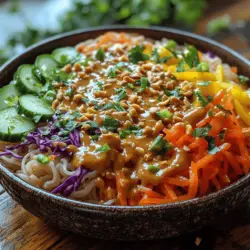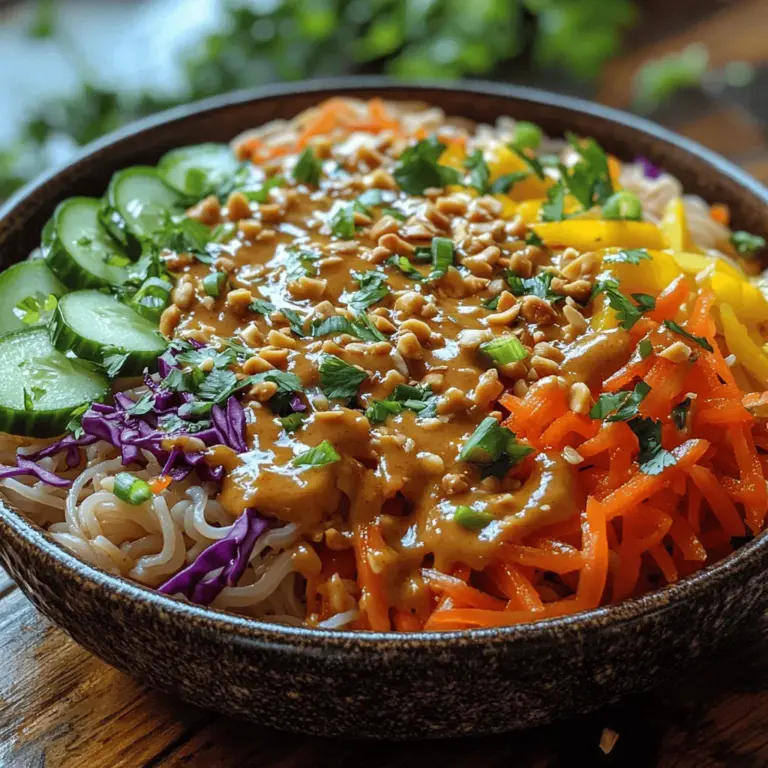Introduction
Thai cuisine is celebrated for its vibrant flavors, aromatic spices, and fresh ingredients that create a symphony of tastes in every dish. Among the plethora of Thai culinary delights, noodle salads occupy a special place, offering a refreshing twist that perfectly balances taste and texture. The Easy Thai Peanut Noodle Salad is a prime example, combining the delicate chewiness of rice noodles with a medley of crisp vegetables and a rich, creamy peanut sauce. This dish has gained immense popularity not only for its mouthwatering flavors but also for its versatility, making it an ideal choice for various occasions.
Whether you’re planning a picnic in the park, a potluck with friends, or a light weeknight dinner, this Easy Thai Peanut Noodle Salad is sure to impress. Its vibrant colors and bold flavors make it visually appealing, while the combination of textures—from crunchy vegetables to tender noodles—ensures a satisfying bite every time. Best of all, this dish caters to diverse dietary preferences, making it a favorite among both vegans and meat-lovers alike. The blend of fresh ingredients and the nutty richness of the peanut sauce create an irresistible salad that everyone can enjoy.
In this article, we’ll explore how to make this delightful salad, beginning with an understanding of the key ingredients that contribute to its deliciousness.
Understanding the Ingredients
To create the perfect Easy Thai Peanut Noodle Salad, it’s essential to understand the role each ingredient plays in crafting its signature taste and texture. Let’s take a closer look at the key components.
Rice Noodles
Rice noodles are a staple in Thai cuisine, known for their delicate texture and ability to absorb flavors. Made from rice flour and water, these noodles are gluten-free and come in various widths, from thin vermicelli to wider flat noodles. They are prized for their chewy bite, which provides a satisfying contrast to the crisp vegetables in the salad. When cooked correctly, rice noodles have a light, airy quality that elevates any dish. Their mild flavor makes them an excellent canvas for the bold ingredients that accompany them in this salad.
Fresh Vegetables
The freshness of vegetables is paramount in this salad, as they contribute not only to the flavor but also to the nutritional profile of the dish. Here are the key vegetables that bring color and crunch to the Easy Thai Peanut Noodle Salad:
– Carrots: Rich in beta-carotene, carrots add a sweet crunch to the salad. Their bright orange color also enhances the visual appeal of the dish.
– Bell Peppers: Available in various colors—including red, yellow, and green—bell peppers offer a sweet, juicy bite. They are packed with vitamins A and C, making them a nutritious addition.
– Red Cabbage: This vibrant vegetable adds a beautiful purple hue and a satisfying crunch. Red cabbage is high in antioxidants and fiber, promoting digestive health.
– Cucumbers: With their high water content, cucumbers provide a refreshing, hydrating element to the salad. They are low in calories and rich in vitamins and minerals, making them a perfect choice for a light dish.
– Cilantro: Known for its distinct flavor, cilantro adds a fresh herbaceous note that brightens the overall taste of the salad. It is also known for its antioxidant properties.
– Green Onions: These mild onions contribute a subtle bite and a pop of green color. They are a great source of vitamins K and C, enhancing the salad’s nutritional value.
The combination of these vegetables not only creates a medley of flavors but also packs the salad with essential nutrients, making it a wholesome choice for any meal.
Preparing the Noodles
Cooking rice noodles may seem straightforward, but there are key steps to ensure they turn out perfectly every time. The goal is to achieve a tender yet firm texture that holds up well in the salad without becoming mushy.
Cooking Instructions
1. Boil Water: Start by bringing a large pot of water to a rolling boil. The amount of water should be sufficient to allow the noodles to move freely as they cook.
2. Add Noodles: Once the water is boiling, add the rice noodles to the pot. Stir gently to prevent them from sticking together.
3. Cooking Time: Refer to the package instructions for the recommended cooking time, typically around 4-6 minutes. Be sure to taste a noodle around the 4-minute mark to check for doneness. The noodles should be al dente, meaning they are cooked through but still have a slight bite.
4. Drain and Rinse: Once the noodles are cooked, drain them in a colander and rinse them under cold running water. This step is crucial as it halts the cooking process and prevents the noodles from becoming gummy.
Cooling Techniques
After rinsing, it’s essential to cool the noodles properly to maintain their texture and freshness. Spread the drained noodles on a large plate or a baking sheet in an even layer. Allow them to cool for about 10-15 minutes before incorporating them into the salad. This cooling technique helps to firm up the noodles and ensures they remain delightful to eat.
Crafting the Salad Base
With the noodles prepped and cooled, it’s time to focus on preparing the salad base. The key to a successful noodle salad lies in how the vegetables are chopped and combined, so let’s dive into the details.
Chopping Techniques
To achieve the best texture and presentation, the way you slice and shred your vegetables matters. Here are some tips for cutting each ingredient:
– Carrots: Use a julienne peeler or a sharp knife to slice the carrots into thin matchsticks. This method ensures they mix well with the other ingredients and provide a satisfying crunch.
– Bell Peppers: Remove the seeds and inner membranes, then slice the bell peppers into thin strips. Vary the colors for a more visually appealing salad.
– Red Cabbage: Cut the cabbage into quarters, then finely shred it using a sharp knife or a mandoline slicer. This technique provides a delicate texture that complements the other vegetables.
– Cucumbers: Depending on your preference, you can slice the cucumbers into rounds or matchsticks. If using larger cucumbers, consider removing the seeds to avoid excess moisture.
– Cilantro and Green Onions: Roughly chop the cilantro leaves and slice the green onions thinly, including both the white and green parts for maximum flavor.
Mixing Instructions
Once all the vegetables are prepped, it’s time to combine them into a vibrant salad base. In a large mixing bowl, add the cooled rice noodles, along with the chopped vegetables. Toss gently with your hands or salad tongs to ensure all ingredients are evenly distributed while maintaining their crunchiness.
This step is essential, as it sets the stage for the final assembly of the salad. Ensuring that each vegetable is well-mixed with the noodles will enhance the overall flavor and texture of the dish.
Making the Perfect Peanut Sauce
The star of the Easy Thai Peanut Noodle Salad is undoubtedly the peanut sauce. This rich, creamy dressing ties all the flavors together and elevates the salad to new heights.
While the recipe for peanut sauce can vary, its core components typically include peanut butter, soy sauce, lime juice, garlic, and ginger. Each ingredient plays a crucial role in balancing the flavors:
– Peanut Butter: Provides the creamy base and rich, nutty flavor. Opt for natural peanut butter without added sugars for the best results.
– Soy Sauce: Adds saltiness and depth to the sauce. For a gluten-free version, substitute with tamari or coconut aminos.
– Lime Juice: Introduces acidity, brightening the overall flavor profile. Fresh lime juice is preferred for its vibrant taste.
– Garlic and Ginger: Both ingredients add aromatic warmth and depth to the sauce. Freshly minced garlic and grated ginger will yield the best flavor.
To prepare the peanut sauce, simply combine all the ingredients in a bowl and whisk until smooth. Adjust the consistency with a splash of water if needed. The sauce should be creamy yet pourable, capable of coating the noodles and vegetables perfectly.
With the peanut sauce ready, you can now dress the salad and serve it as a refreshing, flavorful dish that is sure to delight all palates.
Stay tuned for the next part of this article, where we will explore the final assembly of the salad, tips for serving, and how to store any leftovers for maximum freshness.
{{image_2}}
Creating the Peanut Sauce
The heart of the Easy Thai Peanut Noodle Salad lies in its creamy, flavorful peanut sauce. Achieving the perfect sauce is simple and requires just a few key ingredients. Here’s how to create a delicious peanut sauce that will elevate your noodle salad.
Whisking Instructions
To create a smooth and velvety peanut sauce, start by gathering your peanut butter, soy sauce, lime juice, maple syrup, and any optional ingredients such as sesame oil or garlic.
1. Combine Ingredients: In a medium-sized mixing bowl, add 1/2 cup of creamy peanut butter, 2 tablespoons of soy sauce, 1 tablespoon of fresh lime juice, and 1 tablespoon of maple syrup.
2. Whisk Together: Using a whisk, begin mixing the ingredients together. Start slowly to prevent splattering. The goal is to blend the peanut butter with the liquid ingredients, so it becomes a uniform mixture.
3. Adjust for Consistency: If the sauce is too thick, gradually add water, one tablespoon at a time, until you reach your desired consistency. The sauce should be pourable but still thick enough to coat the noodles. For a smoother texture, continue whisking until all lumps are eliminated.
Customizing the Sauce
One of the best aspects of this peanut sauce is its versatility. You can easily adjust the flavor profile and spice levels to suit your preferences.
– Spice Levels: If you prefer a kick of heat, consider adding red pepper flakes or sriracha. Start with a small amount and increase according to your taste. For a milder sauce, simply omit these ingredients.
– Thickness: Adjusting the thickness can be done with water. If you want a richer sauce, you may also incorporate a teaspoon of coconut milk for added creaminess without diluting the flavor.
Combining Ingredients for Maximum Flavor
Once your peanut sauce is perfectly blended, it’s time to bring all the components together. This step is crucial for ensuring every bite of your salad is bursting with flavor.
Tossing Techniques
1. Prepare Your Noodles: Once your noodles are cooked and cooled, place them in a large mixing bowl.
2. Add Vegetables: Next, add your chopped vegetables—carrots, bell peppers, cucumbers, and any other favorites you have on hand.
3. Pour the Sauce: Drizzle the peanut sauce over the noodles and vegetables.
4. Gentle Tossing: Using tongs or two large forks, gently toss the noodles and vegetables with the sauce. Be careful not to crush the vegetables; your goal is to evenly coat everything with the sauce while keeping the integrity of each ingredient intact.
Serving Suggestions
Presentation matters, especially when it comes to salads. Here are a few ideas for serving your Easy Thai Peanut Noodle Salad:
– Colorful Dishes: Use vibrant serving bowls that contrast with the colors of the salad. A white bowl can make the salad colors pop, while a bamboo dish can enhance the Asian theme.
– Garnishing: Top your salad with chopped peanuts, fresh cilantro, or green onions for added texture and flavor. A sprinkle of sesame seeds can also add a delightful crunch.
– Serve Cold or Room Temperature: This salad can be enjoyed immediately after preparation but also tastes wonderful after it has chilled in the refrigerator for a couple of hours. The flavors meld beautifully over time.
Enjoying the Salad: Serving and Storage
The Easy Thai Peanut Noodle Salad can be a quick meal or a prepared dish for later. Here’s how to best enjoy and store your salad:
Immediate Enjoyment vs. Chilling
Serving your salad immediately allows you to enjoy the fresh crunch of the vegetables and the creamy sauce. However, letting the salad chill for at least 30 minutes enhances the flavors as the noodles absorb the peanut sauce, making every bite deliciously rich.
Storage Tips
If you have leftovers, store them in an airtight container in the refrigerator. Here are some tips to maintain its freshness:
– Separate Sauce and Noodles: If possible, store the peanut sauce separately from the noodles and vegetables to prevent the salad from becoming soggy. You can combine them just before serving.
– Consume Within 3 Days: For the best flavor and texture, aim to eat the salad within three days. After that, the vegetables may start to lose their crunch.
Nutritional Benefits of the Easy Thai Peanut Noodle Salad
This salad isn’t just a treat for the taste buds; it’s also packed with health benefits thanks to its fresh ingredients.
Nutrient Breakdown
– Vegetables: The carrots provide beta-carotene (vitamin A), while cucumbers add hydration and fiber. Bell peppers are rich in vitamins C and E, both essential for a healthy immune system.
– Peanut Sauce: Made primarily from peanuts, this sauce is a source of healthy fats and protein. Peanuts are rich in magnesium, which is vital for energy production, and they also contain antioxidants that help reduce inflammation.
Dietary Considerations
The Easy Thai Peanut Noodle Salad is an excellent option for various dietary needs:
– Vegan: This salad is entirely plant-based, making it suitable for vegan diets.
– Gluten-Free: By using gluten-free soy sauce or tamari, those with gluten sensitivities can enjoy this dish without worry.
– Nut-Free Options: For those with nut allergies, consider substituting peanut butter with sunflower seed butter to maintain a creamy texture.
Conclusion
The Easy Thai Peanut Noodle Salad is a delightful combination of flavors, textures, and nutritional benefits, making it a perfect dish for any occasion. Its ease of preparation, combined with the versatility of the ingredients, allows you to enjoy a fresh, satisfying meal that can be customized to your liking.
Whether you’re preparing a quick lunch, a potluck dish, or a meal prep option for the week ahead, this salad delivers on all fronts. The creamy peanut sauce, crunchy vegetables, and flavorful noodles come together to create a dish that is not only delicious but also nutritious. So, gather your ingredients, follow the simple steps, and experience the joy of making this delightful salad in your own kitchen. Enjoy!


